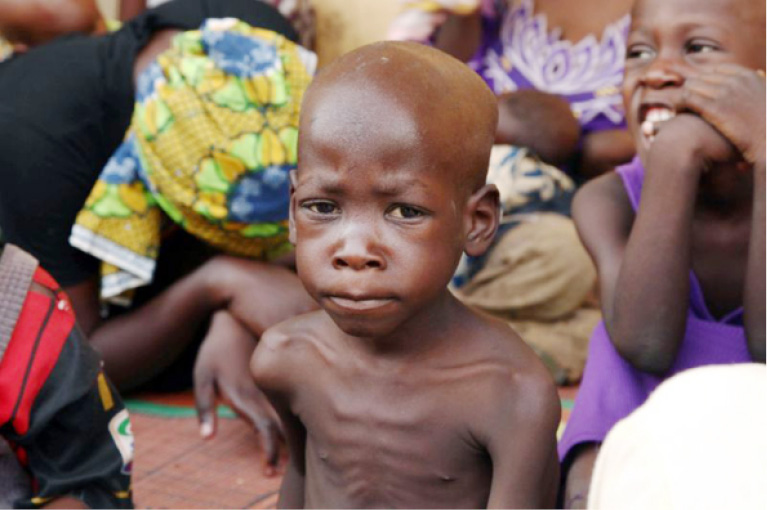Malnutrition: Still a growing menace
Two year old Sapana, though looking a bit brightly, suffers from malnutrition. Her mother knows about exclusive breastfeeding but said she did not “feel like practising it”. Aisha Jamilu is among dozens of women at the Kwali Primary Healthcare facility battling with malnourished children seen during a site visit by journalists organized by Civil Society […]

Malnutrition: Still a growing menace
Two year old Sapana, though looking a bit brightly, suffers from malnutrition. Her mother knows about exclusive breastfeeding but said she did not “feel like practising it”.
Aisha Jamilu is among dozens of women at the Kwali Primary Healthcare facility battling with malnourished children seen during a site visit by journalists organized by Civil Society for Scaling Up Nutrition in Nigeria (CS-SUNN).
According to the World Health Organization (WHO), exclusive breastfeeding means that an infant receives only breast milk. No other liquids or solids are given – not even water – with the exception of oral rehydration solution, or drops/syrups of vitamins, minerals or medicines.
“I know it’s good for my baby but I just didn’t want to do it. I gave her water myself immediately after giving birth to her,” Jamilu said.
“She became malnourished after 18 months and was always sick, vomiting and excreting, with high temperature. I took her to the hospital severally but the drugs given were not helping matters. We were referred to this hospital and were given the Ready to-Use Therapeutic Food (RUTF). Now she is getting better. I regret my actions and would not repeat it for my next child,” she said.
Malnutrition in children is not only connected to morbidity and mortality but is linked to poorer educational attainment, delayed mental development and lower physical abilities in adult life.
Ending malnutrition is pertinent for economical and human development, yet Nigeria loses 2,000 children aged under-five to malnutrition daily, according to records.
Jacinta Ngwu, a nutritionist at the Kwali PHC which is said to attend to two new cases every week, said mothers in rural areas need to be better educated on how to mix and maximize a healthy diet from common local foods—right from conception—to fight malnutrition at the grassroots.
“Most people in Kwali are farmers and they have access to a well balanced diet but they prefer to sell most of the foodstuff then come back and to live from hand to mouth,” she said.
“Antenatal, routine drugs, and in-depth sensitization on the type of food to eat and correcting some unhealthy beliefs will help curb malnutrition in the rural areas.”
Ngwu attributed the recurrence of malnutrition majorly to cultural beliefs, ignorance, environment and poverty.
“From the research we have done so far, their environment, culture and limited finances boost the increase of malnutrition.
“They believe that the first milk (colostrums milk) immediately after birth is dirty milk but on the contrary it contains important nutrients the baby needs.
“Exclusive breast feeding in the first 1000 days is very important and once it’s missed, it’s irreversible,” Ngwu said.
Colostrum refers to the first milk a mother produces after a baby’s birth. It is thick, sticky breast milk that is very important for nourishing and protecting a vulnerable newborn.
In fighting malnutrition, Jacinta noted that female literacy on maternal health knowledge needed to be pushed harder as part of preventive measures needed in tackling the ugly scourge.
“The mothers at child bearing age leave their kids with their grandmother and go to their own various activities and the grandmothers feed these kids with water and other food substances that spur malnutrition
“We keep sensitizing them on behavioural change and updating them on the need to feed their babies correctly,” she said.
Elizabeth Dakwai, in-charge of Kwali PHC, said about 80% of women who come to the facility are educated on the hazards of malnutrition, yet cultural beliefs kept fighting back.
“We have to most times follow them to their houses and enlighten the older parents on the need to allow their children practice exclusive breastfeeding.
“We use sample of their local foods to educate and teach them on how to make a good nutritional meal weekly when they come to the facility,” she said.
Dakwai called for orientation of communities on appropriate health seeking behaviours and utilization of healthcare services at their communities.
Aisha Alhassan, a seven-month-old baby severely malnourished, weighed 2.6cm contrary to the average weight of 16.8cm of a healthy baby. Alhassan lost her mother a night after she was born.
Hassana Tijjani, a mother of three, who took Aisha to hospital, has been buying milk at N2,200 weekly, yet Aisha is malnourished and hasn’t slept well since birth.
“It’s very tedious and demanding; sleepless nights and very expensive to cater for a child in her condition. She cries faintly and looks so pale because she has no strength,” Hassana said.
She pleaded for provision of more micronutrients supplements and resuscitation of the Baby Friendly Hospitals Initiative.
